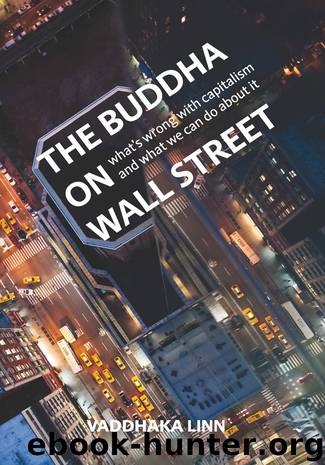The Buddha on Wall Street by Vaddhaka Linn

Author:Vaddhaka Linn
Language: eng
Format: epub
Publisher: Windhorse Publications Ltd
8
The happiness industry
Aldous Huxley’s 1932 novel Brave New World describes a society in which people are selectively bred in incubators to become alphas, betas, gammas, deltas, or epsilons and, once born, are trained to be content with their situation. (Alphas are the highest caste with the best jobs, epsilons are the lowest with the worst jobs.) If they become discontent, they are given soma, a drug designed to make them happy again. In his foreword to the second edition of the book, published in 1947, Huxley warned: ‘The most important [projects] of the future will be vast government-sponsored enquiries into what the politicians and the participating scientists will call the problem of “happiness” – in other words, the problem of making people love their servitude.’1 At present governments and social scientists around the world, including in Britain, France, Canada and the United States, are following the lead of the Buddhist state Bhutan and investigating the potential for implementing national measures of happiness. They are now part of what one respected financial commentator has described as the ‘happiness industry’.2 Should we be worried or should we welcome this as a much-needed alternative to the relentless emphasis on Gross Domestic Product (GDP) and economic growth in the modern capitalist world?
To try to answer this and other questions about happiness, I shall examine what the Buddha said about happiness. This will help to give us a perspective on modern economic discussions about happiness. The Buddha distinguished between different types of happiness. The first important difference is between what he called ‘worldly’ happiness and ‘unworldly’ happiness. Worldly happiness arises in dependence upon sensual pleasure. Unworldly states of happiness arise during deep states of absorption or concentration that can occur in meditation. There is the happiness we can find in external things and people and there is the happiness we can find internally, in our own mind and body, independent of any yearning for something outside us. The happiness that depends upon sensual pleasure is no match for the happiness found within. In one story, the Buddha compares the pleasure he experiences with that of a king. The king can’t sit still and be silent in experiencing pleasure for even one day and night; the Buddha can do so for seven days and nights.3
The second important difference identified by the Buddha is that between happiness that comes with attachment and happiness that comes without attachment. For example, when we read the accounts and poems about Enlightenment given by disciples of the Buddha, we find many poems about the pleasure and happiness they experienced in nature. Cūḷaka, one such disciple, writes:
The peacocks – with lovely feathers, lovely wings,
Lovely blue necks and lovely faces,
Call out – a lovely song with a lovely sound.
This great earth has lovely waters and grasses;
There are lovely clouds in the sky.4
Clearly Cūḷaka enjoys the pleasure and happiness of nature, but with a difference. As an Enlightened being, he enjoys nature while knowing that the cause of his pleasure will not last and is subject to change.
Download
This site does not store any files on its server. We only index and link to content provided by other sites. Please contact the content providers to delete copyright contents if any and email us, we'll remove relevant links or contents immediately.
The Way of Zen by Alan W. Watts(6565)
Ego Is the Enemy by Ryan Holiday(5365)
The Art of Happiness by The Dalai Lama(4103)
The Book of Joy by Dalai Lama(3951)
Why Buddhism is True by Robert Wright(3429)
Spark Joy by Marie Kondo(3278)
Shift into Freedom by Loch Kelly(3172)
Happiness by Matthieu Ricard(3027)
A Monk's Guide to a Clean House and Mind by Shoukei Matsumoto(2894)
The Lost Art of Good Conversation by Sakyong Mipham(2632)
The Meaning of the Library by unknow(2541)
The Unfettered Mind: Writings from a Zen Master to a Master Swordsman by Takuan Soho(2278)
The Third Eye by T. Lobsang Rampa(2245)
Anthology by T J(2189)
Red Shambhala by Andrei Znamenski(2168)
The Diamond Cutter by Geshe Michael Roach(2045)
Thoughts Without A Thinker: Psychotherapy from a Buddhist Perspective by Epstein Mark(1997)
Twilight of Idols and Anti-Christ by Friedrich Nietzsche(1877)
Advice Not Given by Mark Epstein(1867)
